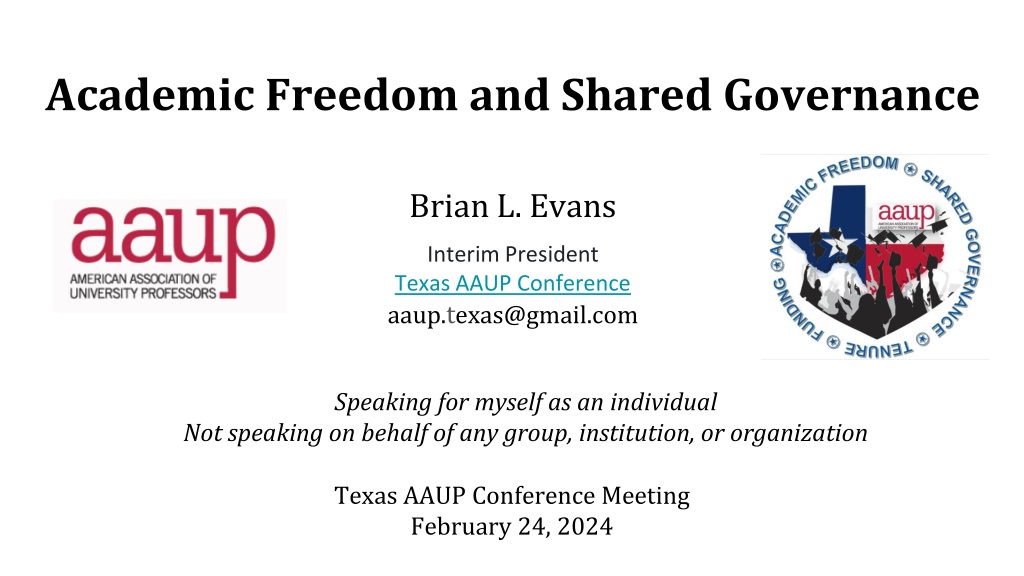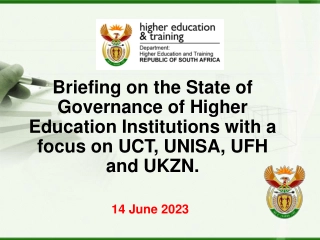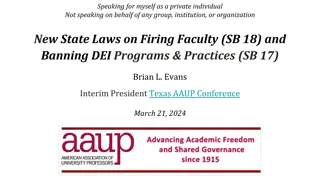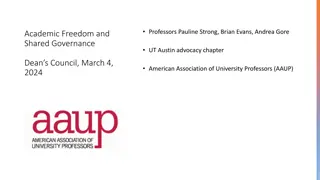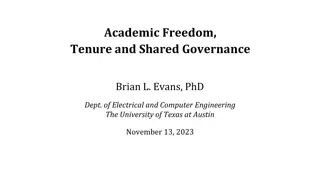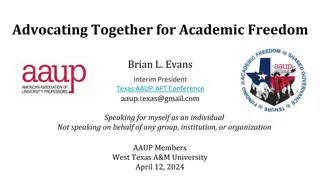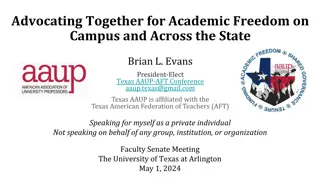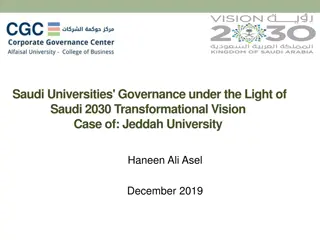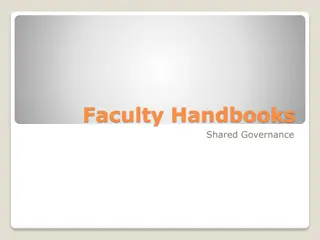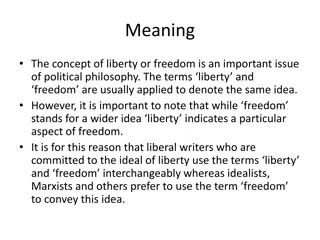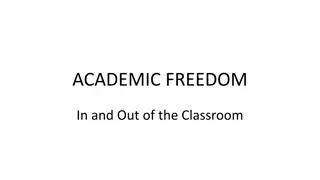Academic Freedom and Shared Governance in Higher Education
Academic Freedom and Shared Governance are foundational principles advocated by the American Association of University Professors (AAUP) to ensure educators have the freedom to explore, research, teach, and discuss without censorship. These principles empower educators to enhance student learning and advance knowledge, emphasizing critical thinking and professional development. The 1940 Joint AAUP/AAC&U Statement of Principles on Academic Freedom & Tenure encapsulates the essence of these principles.
Download Presentation

Please find below an Image/Link to download the presentation.
The content on the website is provided AS IS for your information and personal use only. It may not be sold, licensed, or shared on other websites without obtaining consent from the author. Download presentation by click this link. If you encounter any issues during the download, it is possible that the publisher has removed the file from their server.
E N D
Presentation Transcript
Academic Freedom and Shared Governance Brian L. Evans Interim President Texas AAUP Conference aaup.texas@gmail.com Speaking for myself as an individual Not speaking on behalf of any group, institution, or organization Texas AAUP Conference Meeting February 24, 2024
American Association of University Professors AAUP founded in 1915 by faculty and has 45,000 members. AAUP champions academic freedom, advances shared governance, and organizes all faculty to promote economic security and quality education. AAUP affiliated with the American Federation of Teachers (1.7M members including 148,000 professors) Aug. 2022 Consider Joining AAUP
1940 Joint AAUP/AAC&U Statement of Principles on Academic Freedom & Tenure (2600 words) Amer. Assoc. Colleges & Universities (AAC&U): 860+ institutions Academic Freedom for teachers consists of interrelated elements freedom to explore all avenues of scholarship, research, and creative expression and to publish the results of such work freedom to discuss all relevant matters in the classroom freedom from institutional censorship or discipline when speaking or writing as participants in the governance of an educational institution freedom from institutional censorship when speaking or writing as a citizen Free inquiry, free expression, and open dissent are critical for student learning and the advancement of knowledge Safeguards include tenure, due process, shared governance 1940 Statement: https://www.aaup.org/report/1940-statement-principles-academic-freedom-and-tenure
1940 Joint AAUP/AAC&U Statement of Principles on Academic Freedom & Tenure Academic freedom empowers teachers and researchers to bring the latest breakthroughs into the classroom innovate in scholarly research and creative endeavors disseminate knowledge for the benefit of society Academic freedom allows teachers to help students develop the critical thinking, knowledge, training, and professional networks for successful careers Critical thinking is a required course outcome by THECB. [2] [2] Texas Higher Ed. Coordinating Board, Lower Division Academic Course Guide Manual, Spring 2018.
1966 Statement on Government of Colleges and Universities (3500 words) Jointly formulated by Faculty (AAUP), Presidents (ACE) and Trustees (ACB) American Council on Education (ACE): 1500+ institutions Association of Governing Boards of Universities & Colleges: 1300+ members Faculty have primary decision-making authority in Curriculum, subject matter, and methods of instruction Those aspects of student life which relate to educational process Matters related to faculty status appointments, reappointments, decisions not to reappoint, promotions, granting of tenure, and dismissal President should exercise adversely only in exceptional circumstances, and for reasons communicated to the faculty & receive faculty feedback Faculty have authority in financial exigency and program closures 1966 Joint Statement, https://www.aaup.org/report/statement-government-colleges-and-universities
1966 Joint AAUP/ACE/AGB Statement on Government of Colleges and Universities President shares responsibility in Definition and attainment of goals Administrative action Communications to link components of academic community President provides institutional leadership Innovate, initiate, and persuade others to work toward goals Utilize judgments of the faculty and outside competent scholars Ensure standards and procedures conform to policy established by the board and standards of sound academic practice Manage and create resources President represents institution to public 1966 Joint Statement, https://www.aaup.org/report/statement-government-colleges-and-universities
1966 Joint AAUP/ACE/AGB Statement on Government of Colleges and Universities Maintains a general overview of the institution Entrusts conduct of administration to administrative officers Entrusts conduct of teaching and research to the faculty Publishes codified statements defining policies and procedures Provides long-term resource planning and oversees endowment Obtains capital and operating funds Supports institution when ignorance or ill will threatens any part In grave crises it will be expected to serve as a champion. Governing Board Roles 1966 Joint Statement, https://www.aaup.org/report/statement-government-colleges-and-universities
Texas AAUP Conference Members at 75 universities, comm. colleges, health-related inst. AAUP affiliated with Amer. Federation of Teachers Aug. 1, 2022 Advocacy for higher ed values Ramped up by Texas AFT (10/22) and NAACP LDF (2/23) Wrote op-eds and blogs, and tweeted @TexasAaup Interviewed with reporters ** Created a higher ed bill tracker Coordinated with 10 higher ed advocacy orgs Legislative training, updates and visits ** Testifying at Texas Senate and House committee hearings ** Campaigns for Legislative outreach ** ** As private citizens / AAUP members
Thank You! Consider joining AAUP Consider forming an AAUP Chapter on campus Helps faculty connect with other faculty across campus Gives training on academic freedom, departmental and college governance, and how to get your voices heard Works with Faculty Senate to change policies and encourages members to run for Faculty Senate Provides faculty mentoring Hosts seminars on academic freedom Gives training in Legislative advocacy Advocates at the State Legislature
